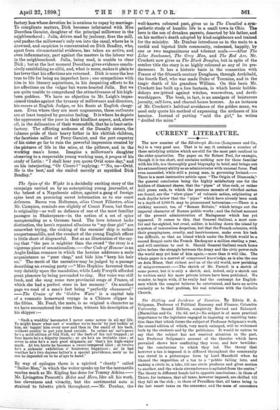CURRENT LITERATURE.
The new number of the Edinburgh Review (Longmans and Co., 6s.) is a very good one. That is to say, it contains a number of those satisfying articles which are still for the most part confined to the older quarterlies. The paper on Sir Robert Peel, for example, though it is too short, and contains nothing new for those familiar with his life, is a'thoroughly good biography in brief, and brings out his extraordinary ability as an administrator with unusual force. Peel even succeeded, while still a young man, in governing Ireland.— There is a most instructive article upon "The Origin of Diamonds," the general conclusion being the highly satisfactory one for the holders of diamond shares, that the "pipes" of blue rock, or rather dull green rock, in which the precious morsels of vitrified carbon are found, are the " blow-pipes " of volcanic action, originating at such depths below that the "pipes" which have already been sunk to a depth of 2,000 ft. may be pronounced bottomless.—There is a striking account, too, of "Roman Britain," which brings out the imperial character of Roman public works ; and the fullest account of the present administration of Madagascar " which has yet appeared. It comes to this, that General Gallieni, a most care- ful and far-sighted, but cruel, soldier, is holding down the island by a system of remorseless despotism, but that the French colonists, with their graspingness, cruelty, and lasciviousness, make even his task too difficult, so that an island which under the British would be a second Bengal costs the French Exchequer a million sterling a year, and will continue to cost it. Should General Gallieni reach home alive before the struggle between the Army and the civic power ends the world may yet hear of him again,—more than it will like. The whole paper is a marvel of compressed knowledge, as is also the one on Asia Minor, that richest sect'on of the old world, now perishing of misgovernment.—The sketch of Mr. Parnell is a sketch of some power, but it is only a sketch, and, indeed, only a sketch can be written until his more private letters have been published. We wonder, to begin with, if he really had the contempt for English- men which the essayist believes he entertained, and have an active curiosity as to that problem, his real relations with the Catholic Church,






































 Previous page
Previous page